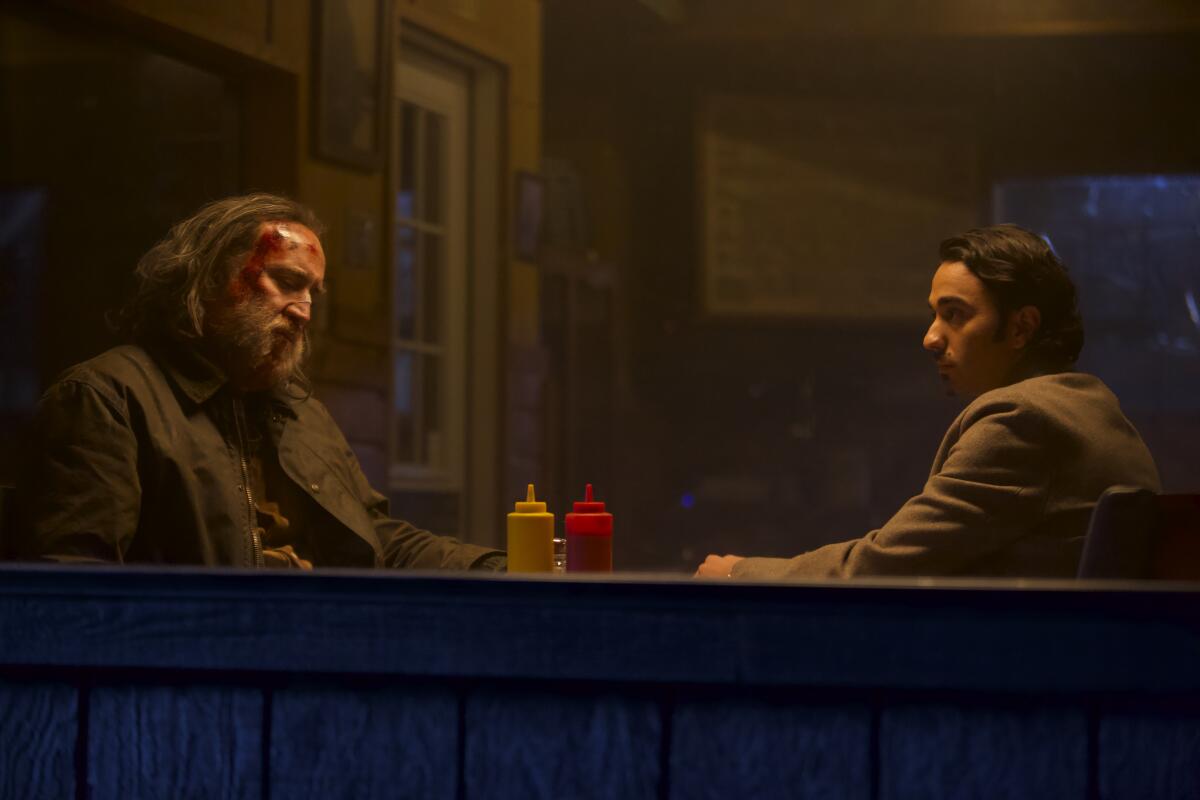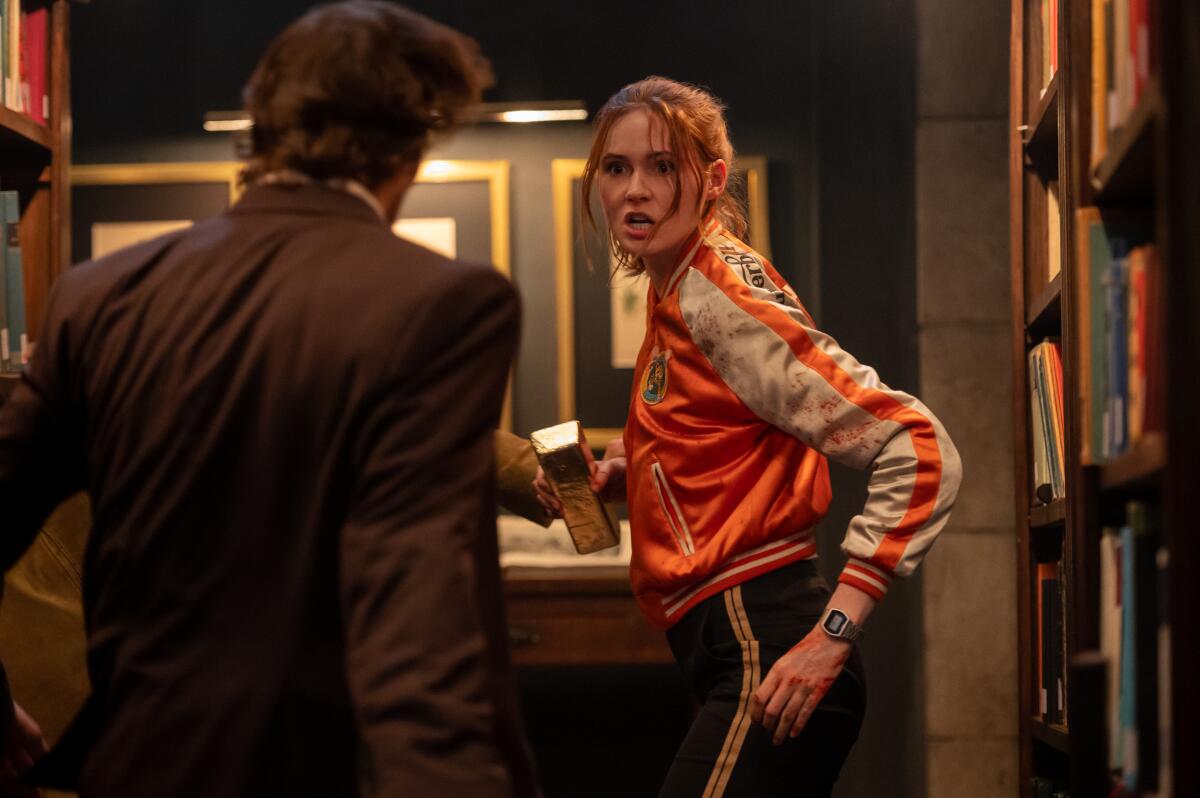Indie Focus: Nicolas Cage searches for his ‘Pig’
Hello! I’m Mark Olsen. Welcome to another edition of your regular field guide to a world of Only Good Movies.
Only good movies
Get the Indie Focus newsletter, Mark Olsen's weekly guide to the world of cinema.
You may occasionally receive promotional content from the Los Angeles Times.
This newsletter is pretty unabashedly pro-seeing movies in movie theaters. Not to the exclusion of other viewing formats, mind you, but just as a preference. There’s really nothing like it. (And we say this recognizing that health and safety regulations are still in flux and that people’s well-being and fully putting the pandemic behind us all is the real priority.)
The Times has been running a series of articles about reopening movie theaters after the pandemic and what the future might hold for exhibitors. Ryan Faughnder and I took a look at what it has been like for local independent theaters in Los Angeles such as the Lumiere Cinema at the Music Hall, Alamo Drafthouse, Landmark Theatres and Laemmle Theatres after more than a year of being closed.
As Greg Laemmle, president of Laemmle Theatres, put it, “For our customers, moviegoing is a habit, and it’s a very important habit. And that habit has been broken. We need to figure out how do we prime the pump and when is the right time to jump into that? We are fighting an uphill battle trying to reestablish the relationship right now.”
Wendy Lee wrote about how exhibitors are trying to use personalized, targeted ads on social media to drum up business among younger viewers, taking their efforts to where potential audiences are in an effort to get them out to theaters.
Josh Rottenberg spoke to employees at local theaters to find out how they made it through. As Jim Nicola, general manager of Landmark’s Nuart Theater, said, “There’s been talk about the death of movie theaters for a while, but they have survived. You can stream all you want, but nothing compares to sitting in a big room in an audience and watching a movie on a massive screen. There are some things you can’t replicate.”
Danielle Broadway spoke to some moviegoers to find out what brought them back. As one patron said, “I like knowing everyone here really wants to be here.”
Despite our love for going to the movies, there are now lots of other ways to watch. The Times will soon be launching a new newsletter known as “Screen Gab” that will spotlight the best in what’s available to watch at home, be it strictly categorized as TV or film (and also explore what the very notion of such taxonomies even mean in our modern world of streaming content). Every week there will be recommendations, analysis, conversations and other exclusive material. You should sign up here.
I am going to be taking a break from the newsletter next week but will return after that. See you soon! Watch some movies however you can!
Enjoying this newsletter? Consider subscribing to the Los Angeles Times
Your support helps us deliver the news that matters most. Become a subscriber.
‘Pig’
Directed and cowritten by Michael Sarnoski in his feature debut, “Pig” is one of the most unexpected movies of the year so far. Seeming like a gonzo story of a man seeking revenge for his pig, the film is actually a melancholy meditation on loss and what drives us. In the film, Nicolas Cage (subdued and wonderful, a welcome reminder of what he is truly capable of) plays a man who lives alone in the woods somewhere outside Portland, Ore. When his beloved truffle pig, his companion and source of income, is stolen, he is forced to head into the city to get him back. The movie is in general release.
For The Times, Noel Murray wrote, “Despite a few scenes here and there of Rob [Robin Feld is the Cage character] snarling, ‘I want my pig back!’ this movie is not the kind of offbeat goof Cage has become infamous for lately. ‘Pig’ is a rich character study, marked by several riveting Cage monologues, as Rob ruminates on the tricky taste of persimmons, or as he warns the Portland status-seekers that the things they think matter will be wiped away when catastrophe comes. … And yet he remains a tragic figure in a way, this pig-loving husk of a man. Rob wants to leave behind everything that’s gone sour in his life. But the flavors and aromas are all around him, lingering on his palate.”
For the New York Times, Jeannette Catsoulis wrote, “While ‘Pig’ can at times feel engulfed by its own sullenness, there’s a rigor to the filmmaking and a surreal beauty to Pat Scola’s images that seal our investment in Rob’s fate. Cage is superb here, giving Rob a subdued implacability and a voice that initially croaks from disuse and later swells with quiet conviction. When Rob delivers a speech about the madness of choosing profit over dreams, it lands with the full weight of an actor who seems to know whereof he speaks.”
For The Wrap, Carlos Aguilar noted a central scene in which Cage’s character puts down the restaurant of an ambitious younger chef with a quiet authority, as, “That scene serves as the main dish of a three-course cinematic meal that’s as unexpected as it’s a strangely poignant. ‘Pig’ is a quest with an aftertaste that’s indescribable but pleasant. Not all the ingredients make sense together, but the product of their intermingling inside the filmmaker’s narrative pot render a special concoction. The recipe feels as if the documentary ‘The Truffle Hunters’ was mixed with a pinch of ‘Fight Club’ and just a dash of the hunger for vengeance in the Cage-starring gory thriller ‘Mandy.’”
For rogerebert.com, Matt Zoller Seitz wrote, “‘Pig’ freely commits to a storytelling aesthetic that will be described as slow, digressive, unfocused, and probably a lot of other pejoratives by anyone who is not able or inclined to get on its admittedly peculiar wavelength. While conceding that it won’t be everyone’s, or even most people’s, cup of tea, I prefer to accept everything it does with an open mind and heart, because it’s so clearly an open-minded and open-hearted film. It’s attentive to regret and failure in ways that American films tend to avoid for fear of bumming viewers out and making them warn other people not to watch the movie. And it seems to understand the way people mythologize others and themselves, and the reasons it happens. The world of ‘Pig’ is as desolate and cruel as ours, but smaller. Everybody in it seems to know everybody else. And still nobody cares. Except for the hero, who loves his pig.”

‘Roadrunner: A Film About Anthony Bourdain’
Directed by Morgan Neville, “Roadrunner: A Film About Anthony Bourdain” is exactly that, a portrait of the widely admired chef turned author, TV host, adventurer and cultural activist who took his own life in 2018. The film had already generated a fair amount of conversation for its depiction of Bourdain’s relationship near the end of his life with actress and filmmaker Asia Argento, when things took a turn this week after it was revealed that some of the voiceover used was generated by an artificial intelligence to sound like Bourdain. The film is in theaters now.
For The Times, Justin Chang wrote that there is “a whiff of misogyny” around the film’s handling of Argento, while adding that in its depiction of Bourdain, “Those who are interviewed remember their friend and colleague with an intense commingling of grief and rage, best expressed by a sequence in which a mural of Bourdain is defaced by the artist David Choe, one of his longtime friends. But that anger is also its own expression of love, and the fact that it all feels so unprocessed and unfiltered is what makes this movie such a strange and sometimes troubling gift to its audience. For two hours it places Bourdain’s voice alongside the voices of those who knew him, as if they were still able to converse on the same spiritual plane. There’s beauty and solace in that illusion, even if the movie can’t — and maybe shouldn’t — begin to answer the unbearably sad question that haunts every frame.”
For The New Yorker, Helen Rosner first uncovered the uncanny A.I. used to fill in some gaps in Bourdain’s voiceover recordings in an interview with Neville. And as she noted, “‘Roadrunner’ doesn’t challenge Bourdain’s hero status (Neville admitted to me that he’s been accused before of hagiography), but his film feels different from much of what’s emerged so far. It attempts to tell the story of who Bourdain was and ends up being a movie about what he left behind. ‘I wanted the film to be cathartic, in a way — not to have good answers, but to at least help people process their feelings,’ Neville said. ‘Because what I saw, sitting down and talking to so many people in his life, is it’s f—ing hard to process the loss of somebody like that. It was happening while I was doing the interviews, it’s been happening while I’ve been making the film, and it will keep happening for years.’”
For Slate, Dana Stevens wrote, “The result is not a dirge-like hagiography but a swift-moving and curiously sprightly movie that captures Bourdain’s vitality, his biting humor, his weapons-grade charisma, and his seemingly limitless hunger for new experiences. It was these qualities, as much as the cuisines he sampled and the people and places he encountered around the globe, that made his TV shows and his writing (which were really one and the same, since he painstakingly wrote and rewrote his own voice-over narration) so distinct from other food- and travel-centric shows on television.”

‘Gunpowder Milkshake’
Directed and cowritten by Navot Papushado, “Gunpowder Milkshake” is a stylized action-adventure shoot-em-up with a knockout cast including Karen Gillan, Lena Headey, Michelle Yeoh, Angela Bassett, Carla Gugino and Paul Giamatti. In the film, an assassin named Sam (Gillan) is sent on the run after falling afoul of the criminal organization she works for, with a young girl (Chloe Coleman) caught in the crossfire in tow. The movie is streaming now on Netflix and is playing at L.A.’s New Beverly Cinema through Sunday.
For The Times, Robert Abele wrote, “Heightened reality doesn’t mean insulting the audience. There are movies that pull you into their own wild, weird world, and movies desperate for you to notice them doing that. ‘Gunpowder Milkshake,’ directed and co-written by Navot Papushado, is the latter, an empty-headed cartoon of slaughter and laminated feminism that is a 25-years-too-late argument for women being action bad asses (who needs convincing still?), as well as never-too-late proof that the Tarantino homage genre needs its own snuffing out.”
For Vulture, Angelica Jade Bastién wrote, “‘Gunpowder Milkshake’ is led by someone without the star power to carry it, surrounded as she might be by actresses far more interesting. … The truth is, even though there are a few older (white) women like Jean Smart getting a career resurgence, Hollywood as a whole hasn’t caught on to the richness of storytelling that comes from focusing on veteran actresses, who put younger actors trying to claw their way to stardom from the morass of superhero IP to shame.”
For Polygon, Roxana Hadadi, wrote, “A seemingly lab-grown, algorithm-assembled array of elements meant to please everyone, ‘Gunpowder Milkshake’ boasts a solid supporting cast. … There are a couple of thrilling action sequences, and the production design flickers between emulating Nicolas Winding Refn’s neon-soaked indulgence and Michael Mann’s sparsely cool neo-noirs. But it’s difficult to tell what Navot Papushado’s own directorial style might be like when ‘Gunpowder Milkshake’ feels like a grab bag of other filmmakers’ quirks, from Zack Snyder’s slow-motion tableau pans to J.J. Abrams’ snap-zooms. Like so many recent action movies, ‘Gunpowder Milkshake’ is hampered by an overzealous editing style that denies viewers the satisfaction of bodies in motion. And like so many recent movies aimed at a female audience, it’s full of feminist promises that wind up feeling thin.”
I think one of my favorite things I saw this week was the short Instagram talk show parody “Chillin with Gillan” that Karen Gillan made in her garage.

Only good movies
Get the Indie Focus newsletter, Mark Olsen's weekly guide to the world of cinema.
You may occasionally receive promotional content from the Los Angeles Times.




